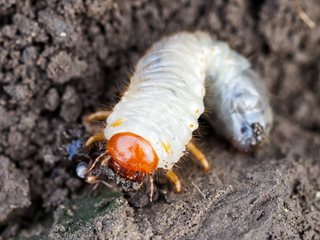Grub worms can be a menace to your garden. These tiny Japanese beetle, June beetles, or European chafer beetles larva can feed on your plant roots resulting in the death of your plants and brown patches on your lawn.
Here is a comprehensive guide on how to get rid of grub worms.

First, determine the type of grub that has infested your lawn or garden.
If your lawn has irregularly placed brown patches, chances are grub worms are eating the roots of your roots, leaving them to die out.
Grass with no roots, birds making holes in your lawn, spongy feel on your lawn when walking and grass with no roots are some telltale signs of grub worm infestation.
Use beneficial nematodes
One natural way of getting rid of grub worms is through the use of Heterorhabditis bacteriophora (Hb nematodes). They parasitic worms that cannot be seen in the naked eye that invade grubs and kill them. If you are in a hurry, this may prove long considering the time taken (3 years plus) to contain your situation thoroughly.
Apply them at noon and then immediately water your lawn.
Milky Spore
Bacillus papillae specifically work against Japanese beetles. Sprinkle the powder either with water or in dry form. However, milky spores work best in bugs infested grass compared to a small population of the beetles.
Keeping your grass longer than 2 inches
Given the metamorphic cycle of the grubs, planting grass before the eggs hatch can help. Allowing your grass to grow 2 inches and more you discourage beetles that tend not to lay eggs in the long grass. In a sense, this checks the grub population.
Robins and songbirds can assist you in solving your grub worm problem. These birds prey on the worms, especially during the larva stage (when they are most destructive). If you can get them to come to your lawns, then you will solve some of your landscaping issues.
Dealing with grubs requires patience, especially if you are not fond of using chemical pesticides. These natural solutions come in handy, albeit with a lot of time employed.
